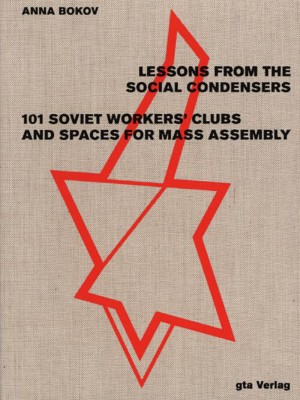By Anna Bokov
In the Soviet Union in the 1920s, the term “social condenser” came to signify architecture’s agency in shaping individual behaviours and reforming society at large. The buildings conceived as structures for public assembly according to these ideals are among the earliest experiments of the modern movement. Despite their indisputable impact, there is little insight into this considerable body of work. The 101 case studies presented in Lessons from the Social Condensers. 101 Soviet Workers' Clubs and Spaces for Mass Assembly reflect the wide reach of early Soviet social condensers and serve as precedents for how architecture can activate social function, yet also as cautionary tales of architecture as an instrument of state propaganda, social engineering, and territorial control.
Zurich, 2023, 28 x 21 cm, 190pp, illustrated, Paperback.
